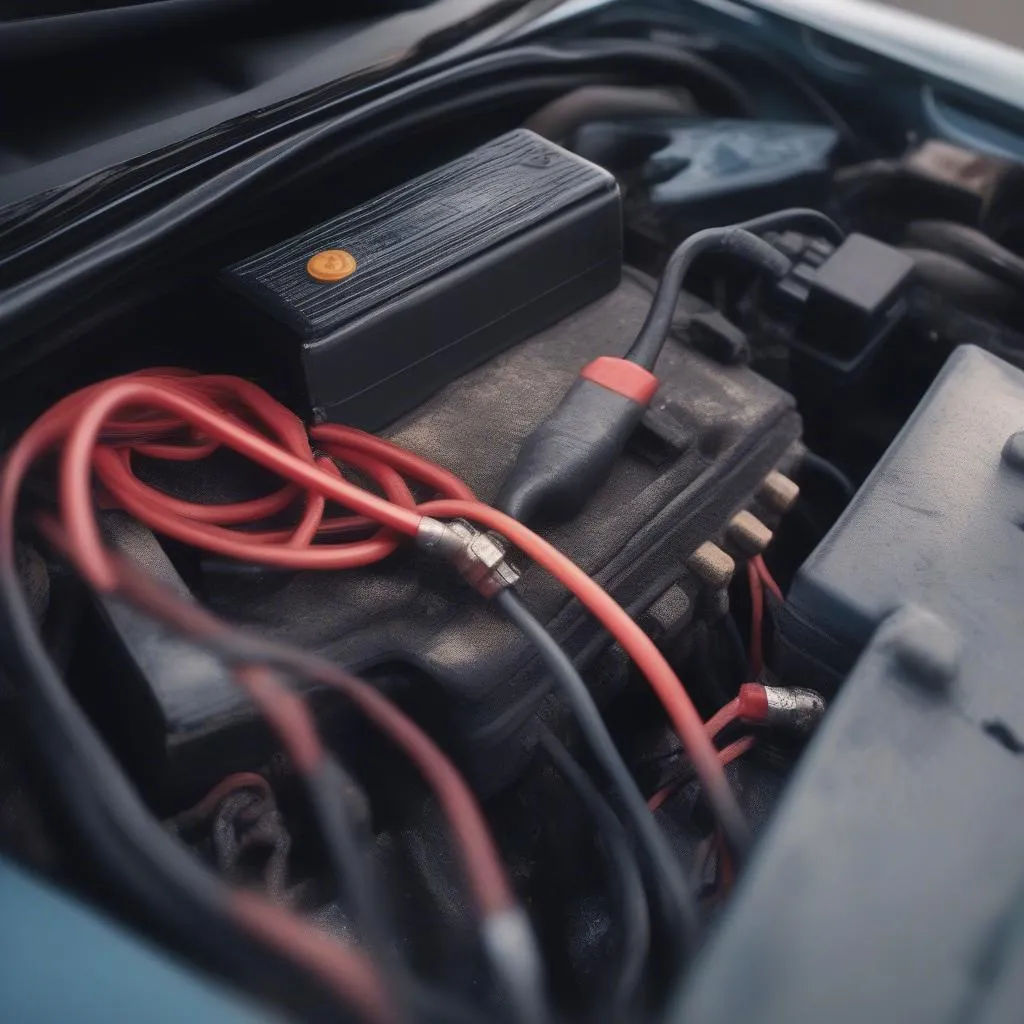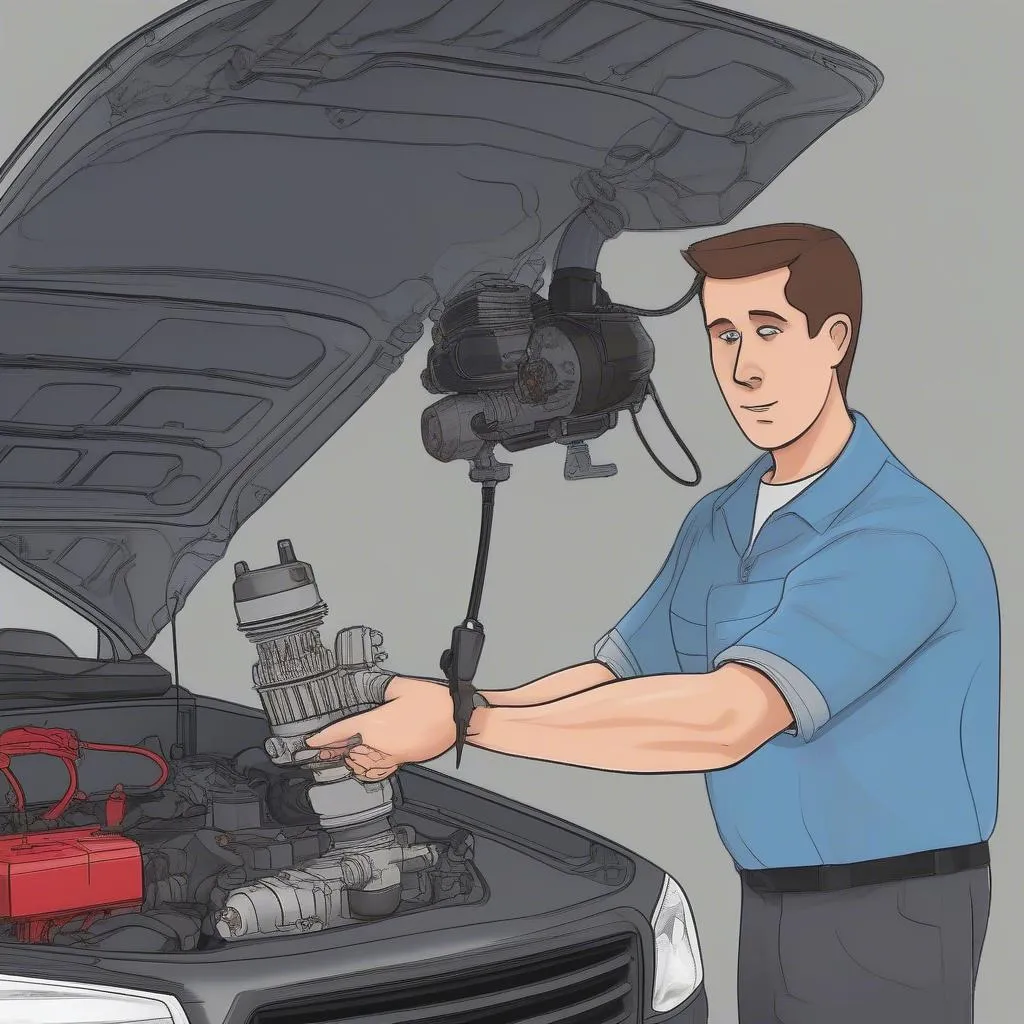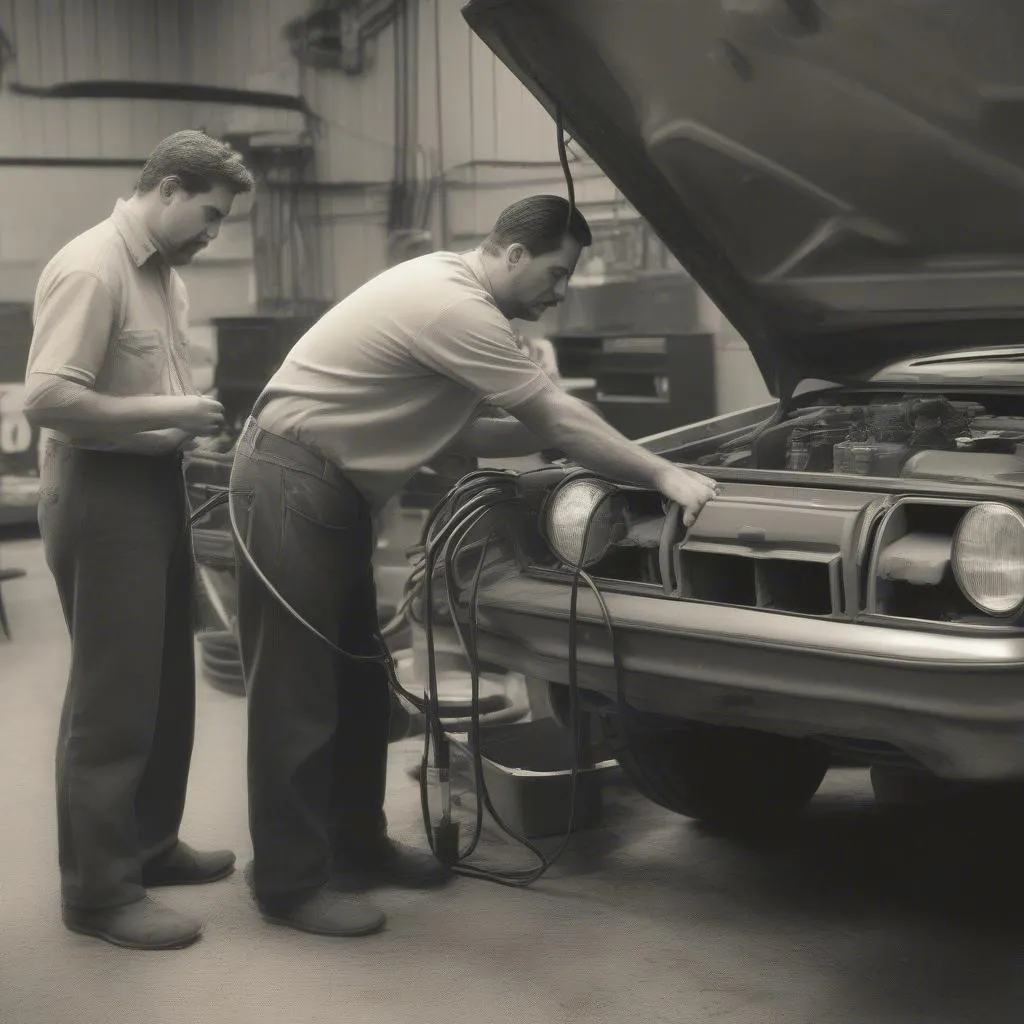“So, I hopped in my car this morning, turned the key, and… nothing. Well, not exactly nothing. The radio came on, the headlights worked fine, but the engine wouldn’t even try to crank. It was like trying to start a spaceship with a dead battery. I was stuck in my driveway in Pasadena, California, late for work, with a car that seemed to have a mind of its own! Sound familiar?”
Decoding the Frustration: What Does “Car Won’t Turn Over But Lights Come On” Even Mean?
For car owners: This phrase usually translates to a wave of panic, a missed appointment, and a nagging feeling of “what now?”. Your car is showing signs of life – the lights are on, after all – but it’s refusing to take you anywhere.
From a mechanic’s perspective: This situation often points to a problem in the starting system, but one that doesn’t involve the battery completely dying. It’s like having all the ingredients for a cake but no oven to bake it in.
In technical terms: The electrical system that powers your lights and accessories is working, but the system responsible for physically turning the engine over isn’t getting the juice it needs.
Why Won’t My Car Start Even Though the Lights Work?
Let’s shed some light on this common car issue. There are several culprits behind this frustrating scenario:
1. A Weak or Dying Battery
Yes, you read that right. Even though your lights come on, your battery might not have enough power to crank the engine. Think of it like this: a single candle can light a room, but it can’t power a refrigerator. Your car battery might be strong enough to power the lights but too weak to turn the starter motor, which demands a lot of power.
What to do: Jump-starting your car is a good first step. If it works, get your battery tested and potentially replaced. It might be nearing the end of its lifespan.
2. Faulty Starter Motor
The starter motor is the muscle behind your engine’s ignition. When you turn the key, it engages with the engine’s flywheel, setting those pistons in motion. If your starter motor is faulty, your car might not turn over, even with a healthy battery.
What to do: Listen closely when you try to start your car. Do you hear a clicking sound? That’s a telltale sign of a failing starter motor. Get it checked by a mechanic, as a faulty starter motor usually needs to be replaced.
3. Ignition Switch Problems
The ignition switch is like the command center for your car’s starting system. Turning the key sends a signal to various components, including the starter motor. A faulty ignition switch might not be sending the right signals, leading to a no-start situation.
What to do: If your car has other electrical issues alongside the starting problem, like flickering dashboard lights or a malfunctioning radio, a faulty ignition switch could be the culprit. It’s best to have a mechanic diagnose and address this issue.
4. Bad Starter Solenoid
The starter solenoid acts as a bridge between the battery and the starter motor. It receives the signal from your ignition switch and delivers the necessary power to the starter motor. A failing solenoid can interrupt this process, leaving you stranded.
What to do: A clicking sound when you try to start the car can also indicate a faulty starter solenoid. Like the starter motor, it often requires replacement.
5. Other Electrical Gremlins
Sometimes, the issue might lie in the complex network of wiring and connections within your car’s electrical system. A loose connection, a blown fuse, or even corrosion can disrupt the flow of electricity, leading to starting problems.
What to do: Diagnosing electrical problems requires a multimeter and a good understanding of your car’s wiring diagrams. Unless you’re comfortable with electrical troubleshooting, it’s best to leave this to a professional mechanic.
 Jumpstarting a Car Battery
Jumpstarting a Car Battery
“My car won’t turn over but the lights come on” – Common Scenarios
Let’s put this into context with some familiar situations:
-
The morning struggle: You’re rushing to work, but your car refuses to start. The lights come on, but the engine won’t crank. This scenario often points to a weak battery, especially if you left your headlights on overnight.
-
The flickering dashboard: You notice your dashboard lights dimming or flickering when you try to start the car. This can be a sign of a failing battery, a loose connection, or a problem with the alternator, which recharges the battery while you drive.
-
The clicking sound: A rapid clicking sound when you turn the key is a common symptom of a faulty starter motor or starter solenoid. It means the electrical system is trying to engage the starter, but it doesn’t have enough power to turn the engine over.
 Car Starter Motor
Car Starter Motor
Getting Back on the Road: What to Do When Your Car Won’t Start
Experiencing this issue can be stressful, but here’s a step-by-step guide to help you get back on track:
-
Stay calm and assess the situation: Don’t panic! Take a moment to observe the symptoms. Do the lights dim significantly when you try to start the car? Do you hear any unusual sounds?
-
Check the Battery: If you suspect a weak battery, try jump-starting your car. If it starts, drive directly to a mechanic or auto parts store to get your battery tested and potentially replaced.
-
Inspect for loose connections: If you’re comfortable with basic car maintenance, open the hood and visually inspect the battery terminals and wiring for any loose connections or corrosion. Tighten any loose connections and clean any corroded terminals with a baking soda and water solution.
-
Call a Mechanic: If jump-starting doesn’t work, or if you suspect a problem with the starter motor, ignition switch, or other electrical components, it’s best to call a qualified mechanic. They have the tools and expertise to diagnose and repair the issue safely and efficiently.
FAQs: Your Burning Questions, Answered
-
Can a bad alternator cause my car not to start? Yes, a faulty alternator can eventually drain your battery completely, leading to a no-start condition. However, you’ll usually experience other symptoms like dimming lights and electrical issues before it gets to that point.
-
Can extreme temperatures affect my car’s starting ability? Yes, both extreme heat and cold can affect battery performance. Batteries tend to drain faster in cold weather.
-
If my car starts after a jump, do I still need a new battery? It’s highly recommended to get your battery tested even if it starts after a jump. A jump start might get you going temporarily, but a weak battery might leave you stranded again soon.
Need More Help with Your Car Troubles?
Experiencing car problems can be a real headache. If you’re struggling with a car that won’t start or any other automotive issues, we’re here to help! Contact our team of expert mechanics at +84767531508 for fast and reliable assistance. We’re available 24/7 to get you back on the road.
Related Articles You Might Find Helpful:
- Car Turning Over But Not Starting
- Why Won’t My Car Start?
- Car Dead No Clicking
- Lights Come On But No Crank
Don’t let car troubles put a damper on your day. Get in touch today, and let our experienced team keep your vehicle running smoothly.
 Mechanic Diagnosing Car Problem
Mechanic Diagnosing Car Problem